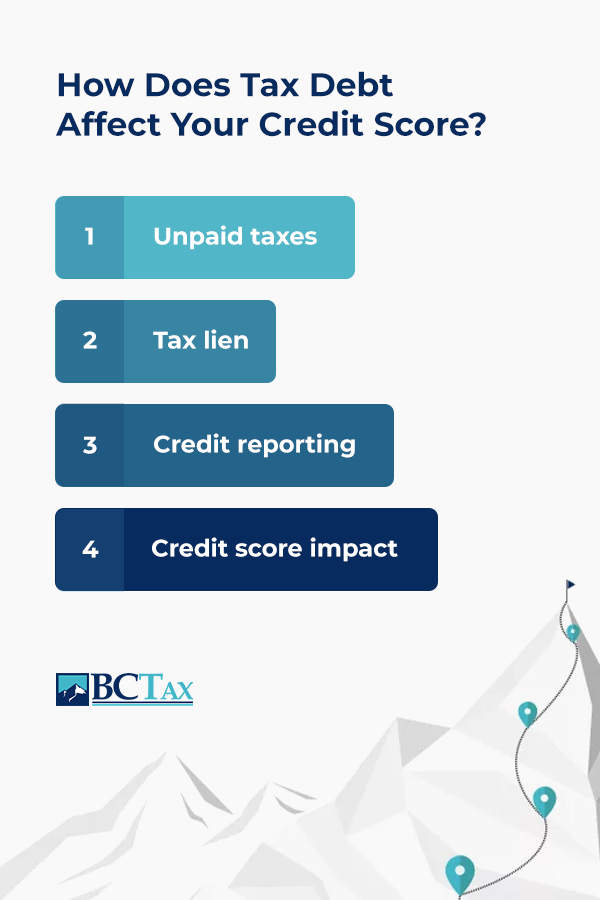Tax season. Just the words can send shivers down your spine, right? We all strive to pay our taxes on time, but life throws curveballs. Sometimes, despite our best efforts, we can fall behind. And when that happens, a big question looms: does tax debt hurt your credit score? Let’s dive into the details and separate fact from fiction, so you can understand the real impact and take steps to protect your financial health.
Understanding How Tax Debt Impacts Your Credit Score
So, does owing money to the IRS automatically tank your credit score? The answer is a bit nuanced. Directly, unpaid tax debt doesn’t show up on your credit report in the same way as a late credit card payment or a defaulted loan. However, the IRS has tools at its disposal that can indirectly affect your creditworthiness.
Think of it this way: the IRS isn’t a credit reporting agency. They don’t typically report your debt to Experian, Equifax, or TransUnion. But, if you ignore the debt and fail to take action, they can take steps that ultimately impact your credit.
Tax Liens and Your Credit Score
A tax lien is a legal claim the IRS places on your property when you fail to pay your taxes. It’s a public record, and it used to be a common way for the IRS to signal to creditors that you had outstanding debt. But things have changed.
The Impact of Tax Liens on Credit Reports (Past vs. Present)
Previously, tax liens were reported directly to credit bureaus and could significantly damage your credit score. This made it harder to get loans, mortgages, or even rent an apartment. However, in 2017, the major credit bureaus stopped including most tax liens on credit reports. Why? Because the accuracy and consistency of the data were questionable.
Important Note: While most tax liens are no longer reported, it doesn’t mean the IRS has forgotten about your debt! They still have the legal right to collect what you owe.
Tip: Just because a tax lien isn’t on your credit report doesn’t mean it’s gone. The IRS can still pursue collection actions, such as wage garnishment or bank levies.
Indirect Ways Tax Debt Can Affect Your Credit
Even without direct reporting of tax liens, unpaid tax debt can still indirectly impact your credit score. How? Let’s explore some scenarios:
- Late Payments on Credit Cards: If you’re struggling to pay your taxes, you might also be struggling to keep up with other bills, like credit card payments. Late payments are a major red flag for credit bureaus and can significantly lower your score.
- Increased Credit Utilization: Facing a large tax bill might lead you to max out your credit cards to cover expenses. High credit utilization (the amount of credit you’re using compared to your total credit limit) can negatively affect your credit score.
- Difficulty Obtaining New Credit: While the lien itself may not be on your report, the underlying financial stress can make it harder to qualify for new credit. Lenders might see other signs of financial distress and deny your application.
Managing Your Finances During Tax Debt
It’s crucial to manage your finances carefully when dealing with tax debt. Prioritize paying your essential bills on time to avoid further damaging your credit. Consider creating a budget and exploring options for managing your tax debt, such as payment plans or offers in compromise.
Strategies for Managing Tax Debt and Protecting Your Credit
Okay, so you’re facing tax debt. What can you do to minimize the impact on your credit and get back on track? Here are some actionable steps:
- Communicate with the IRS: Don’t ignore the problem! Contact the IRS and explore your options for resolving the debt. They offer various payment plans and programs to help taxpayers in different situations.
- Set up a Payment Plan (Installment Agreement): The IRS offers installment agreements that allow you to pay off your tax debt over time. This can help you avoid further penalties and collection actions.
- Consider an Offer in Compromise (OIC): An OIC allows you to settle your tax debt for a lower amount than you owe. However, it’s not easy to qualify for, and you’ll need to demonstrate significant financial hardship.
- Monitor Your Credit Report: Regularly check your credit report for any errors or signs of identity theft. You can get a free copy of your credit report from each of the major credit bureaus once a year at AnnualCreditReport;com.
Tip: Don’t be afraid to seek professional help! A tax attorney or enrolled agent can provide expert guidance and represent you before the IRS.
FAQ: Tax Debt and Your Credit Score
Q: Will the IRS notify credit bureaus if I start a payment plan?
A: No, simply starting a payment plan with the IRS will not be reported to credit bureaus. However, it’s crucial to stick to the payment schedule to avoid further issues.
Q: Can I remove a tax lien from my credit report if it’s inaccurate?
A: If you find a tax lien on your credit report that is inaccurate or has been satisfied (paid off), you have the right to dispute it with the credit bureau. Provide documentation to support your claim.
Q: What happens if I ignore my tax debt completely?
A: Ignoring your tax debt can lead to serious consequences, including wage garnishment, bank levies, and property seizure. It’s always best to address the issue proactively.
So, while tax debt doesn’t directly slam your credit score the way it used to, it’s still a serious issue that demands attention. Failing to address it can lead to financial stress and indirectly impact your creditworthiness. The key is to be proactive, communicate with the IRS, and explore your options for resolving the debt. Remember, taking control of your finances is always the best strategy. Don’t let tax debt become a long-term burden; take action today to protect your financial future.






